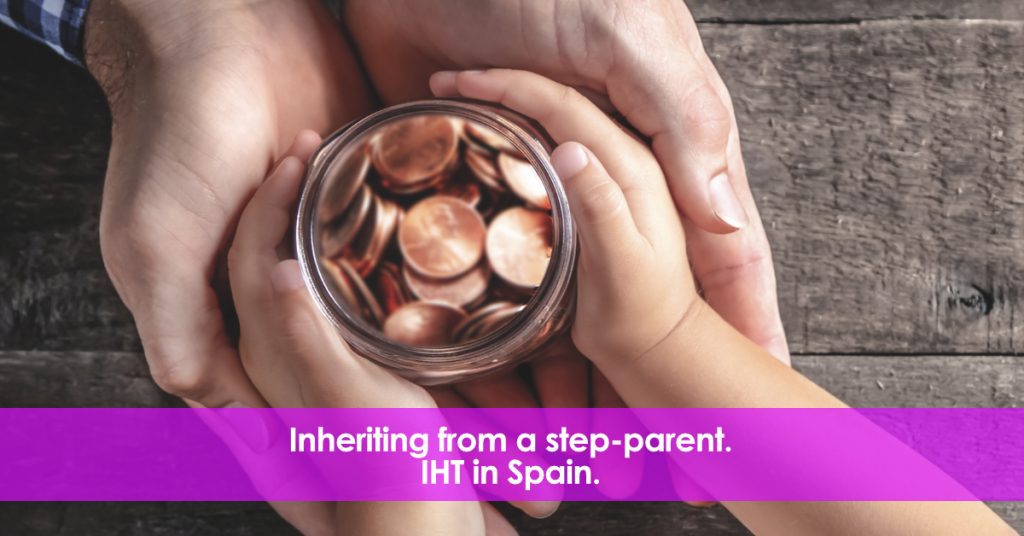One of the questions we are most frequently asked by our clients, when dealing with an inheritance, is how much Inheritance Tax (IHT) they will have to pay. In previous articles we have discussed this subject in depth. Today we want to cover this topic from a different perspective: The tax treatment of inheriting from a step-parent. Into which group, of the ones foreseen in the IHT, do relatives by affinity belong?. What tax implications does this have?. We answer this question, and others, below.
Kinship by “blood” and Kindship by “affinity”.
Let’s start by making a basic distinction between kinship by blood and kinship by affinity. The first one is the bond we have with relatives connected to us by a natural blood relationship (that also includes adopted children). The second type of kinship, by affinity, occurs when two people get married. From that moment on, each person becomes, for legal purposes, a relative “by affinity” of the family of his or her spouse. In other words, if Susan marries John, his son from a previous marriage (Peter) will become, by “affinity”, Susan’s stepson. And she will become his stepmother.
How does this affect Inheritance Tax (IHT)?.
Tax benefits provided for in the Inheritance Tax vary according to the relationship between the deceased and the heir. The closer they were, the lower the inheritance tax to be paid by the heirs is. The Spanish IHT classifies the heirs into four groups:
1.- Group I: descendants and adopted children under 21 years of age.
2.- Group II: descendants and adopted children of age 21 or older, spouses, ascendants and adoptive parents.
3.- Group III: second and third degree collaterals, ascendants and descendants by affinity.
4.- Group IV: collaterals of the fourth degree, more distant degrees and strangers.
The question that arises when inheriting from a step-parent is obvious: Which group do the stepchildren fall into: Group III or Group IV?. The tax repercussions of belonging to one or the other are quite relevant. Group III foresees a tax reduction up to 7.993,46€, whereas in Group IV there is no reduction at all. Additionally, the multiplier coefficient is higher in Group IV, resulting in a much higher tax if you are in this category.
The end of the affinity relationship, according to the Supreme Court.
For many years, the General Directorate of Taxes considered that the link between stepchild and step-parent ended with the death of the person who served as a nexus between the two. In other words (and following the example used above) if John dies, the link of affinity between Susan (stepmother) and Peter (stepson) would disappear. And, therefore, the stepson would be included in Group IV, with the tax disadvantage that this entails.
However, the Spanish Supreme Court does not agree with this interpretation. This was made clear in Ruling 647/2017. Even after the death of the spouse who acted as a link between the two relatives by affinity (“stepson” and “stepmother”), the bond between the two remains intact. This effectively means that stepchildren, nephews-in-law, brothers and sisters-in-law, sons and daughters-in-law, etc. fall into Group III. And they will have a more favourable tax treatment than if they were in Group IV, where the more distant and strange collaterals are found. In principle, the link between a stepchild and a step-parent terminates only in the case of divorce or if the widowed spouse remarries.
Conclusions
At White Baos Lawyers we are experts in legal advice on inheritances, inheritance tax and Spanish wills. If you wish to obtain more information on taxation when inheriting from a step-parent, or if you wish to minimise Inheritance Tax, etc., please do not hesitate to contact us.
The information provided in this article is not intended to be legal advice, but merely conveys information relating to legal issues.
Carlos Baos (Lawyer)
White & Baos.
Tel: +34 966 426 185
E-mail: info@white-baos.com
White & Baos 2023 – All Rights Reserved.
